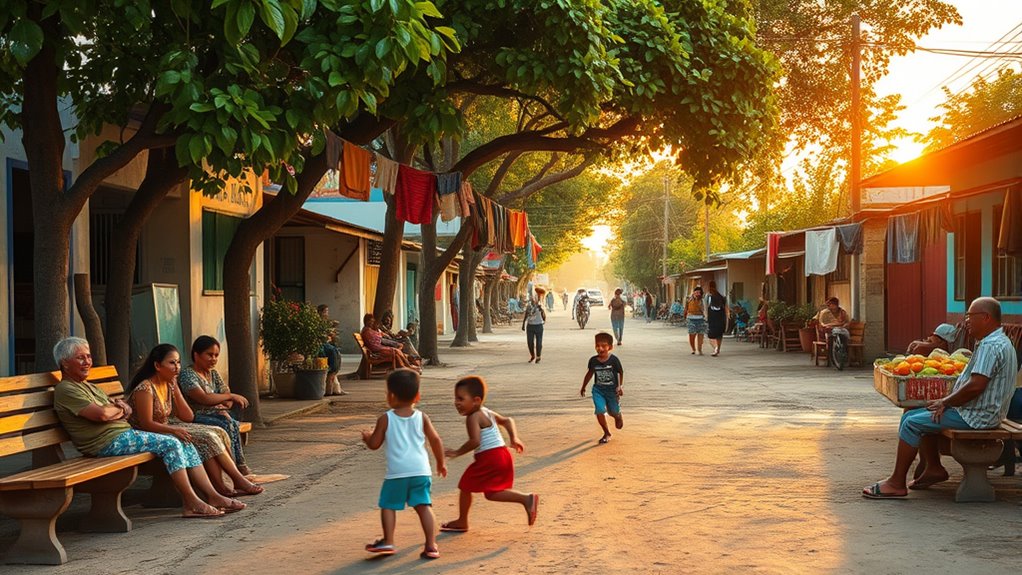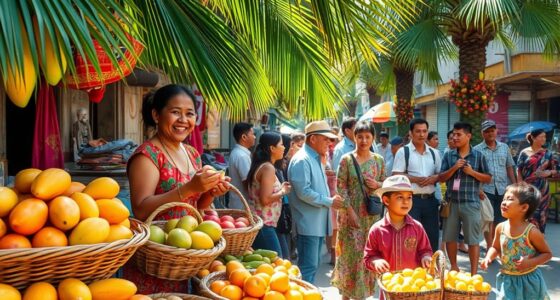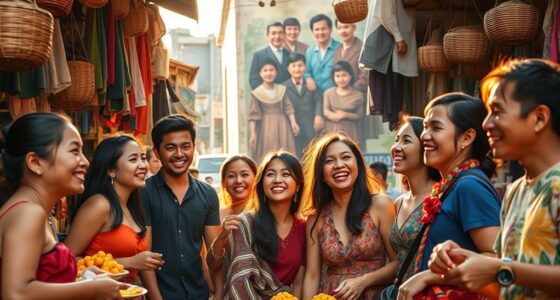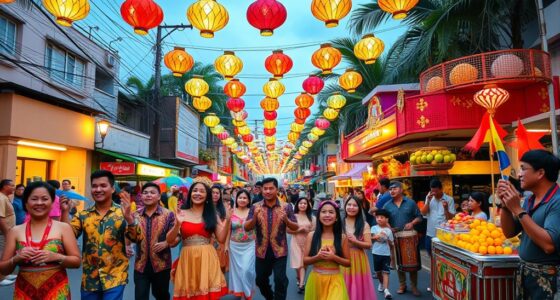Barrio life is essential in shaping Filipino relationships. It fosters strong family ties through extended households, where elders guide the young, reinforcing cultural values. Neighbors support each other in daily needs, creating a sense of trust and loyalty. Community events, like festivals, enhance bonds and keep traditions alive. With local education and entrepreneurship thriving, barrios promote collaboration and shared resources. If you explore further, you’ll uncover even more about how these relationships are woven into the fabric of barrio life.
Key Takeaways
- Barrios foster strong family dynamics, with extended families living together and sharing responsibilities, reinforcing unity and cultural values.
- Trust and loyalty among neighbors create a supportive social fabric, essential for daily interactions and collective problem-solving.
- Community events like Barrio Fiesta promote relationship-building through shared celebrations, enhancing social cohesion and cultural identity.
- Elders play a crucial role in guiding younger generations, passing down traditions and values that strengthen family bonds and community ties.
- Economic interactions within barrios encourage collaboration, with residents relying on each other for financial support and local entrepreneurship.
Geographical and Cultural Significance of Barrios
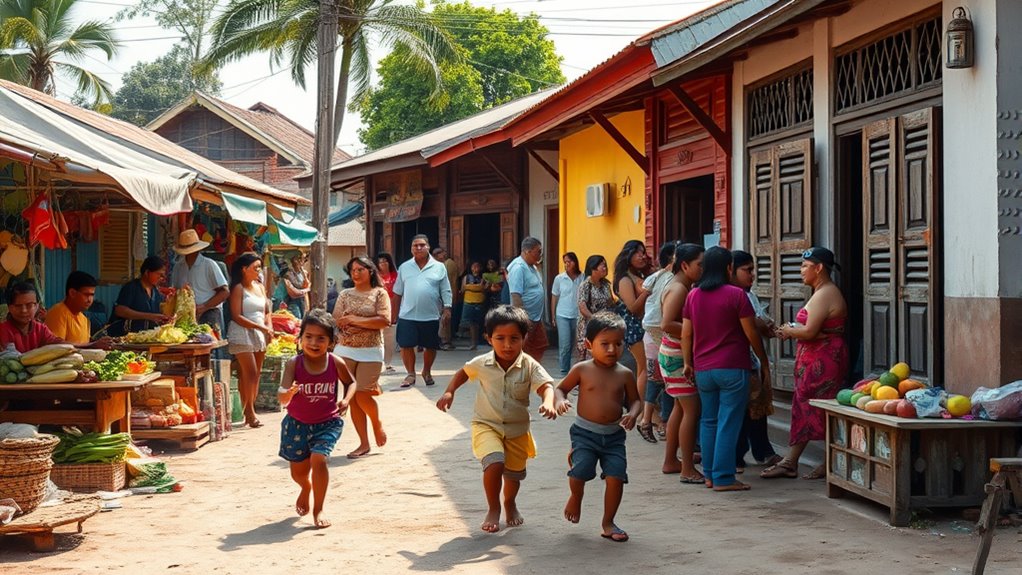
While exploring the geographical and cultural significance of barrios, you’ll find that these vibrant communities are essential for preserving Filipino heritage.
Traditional festivals, like Barrio Fiesta, showcase the rich culture through parades, street dancing, and traditional games, fostering a strong sense of community.
Barrio Fiesta celebrations bring communities together, highlighting rich traditions through vibrant parades, lively street dancing, and engaging games.
Barrios also act as ethnic enclaves, helping maintain cultural identity and cohesion, especially for Filipinos in diaspora. Their historical significance is reflected in the themes represented during these celebrations, keeping the past alive.
Despite globalization, barrios adapt while emphasizing core values like hospitality and community. They serve as cultural hubs, promoting arts and engagement, ensuring that the legacy of Filipino traditions thrives in an ever-changing world.
Family Dynamics and Socialization in Barrio Life

In barrio life, family dynamics and socialization play an essential role in shaping relationships and community bonds. You’ll find that extended families often live together, creating a strong sense of unity.
Elders are respected figures, guiding younger generations and imparting valuable wisdom. Community events bring families together, reinforcing connections and shared responsibilities. Neighbors actively participate in each other’s lives, fostering a supportive environment.
Children learn cultural values and traditions from older family members, ensuring these practices endure. This collective involvement not only strengthens family ties but also enhances social networks, making everyone feel secure. As you engage in barrio life, you’ll experience how these dynamics contribute to resilience and a rich cultural heritage. Moreover, the functional layout of homes in the barrio allows for closer interactions among families, promoting a sense of togetherness.
Trust, Loyalty, and Neighborly Support
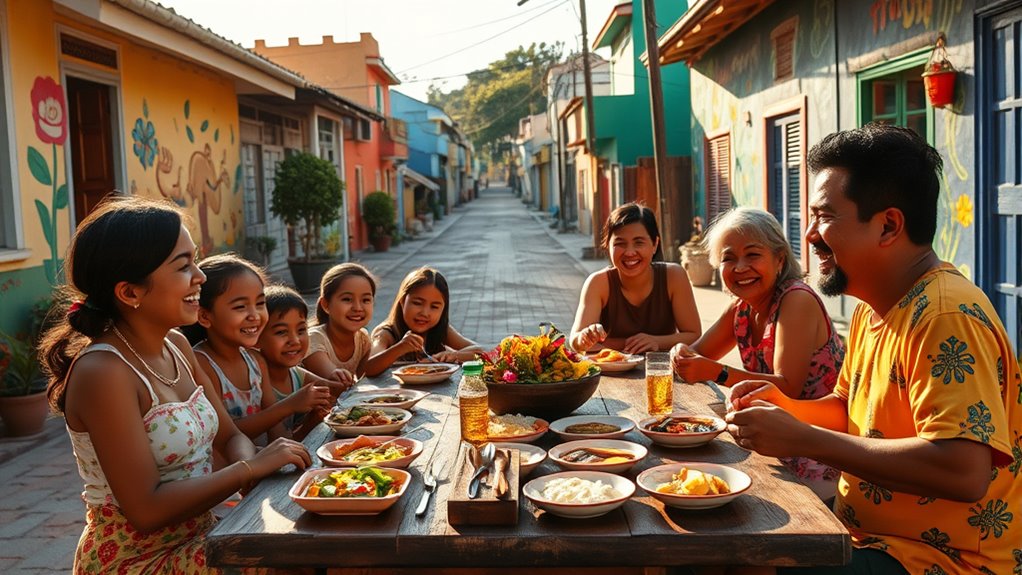
Trust, loyalty, and neighborly support form the backbone of barrio life, creating a tightly woven social fabric. You rely on your neighbors for daily needs, fostering a sense of interdependence essential in rural areas.
Community events, like festivals, unite everyone and strengthen these bonds. Shared customs and traditions enhance trust, while neighborhood watch programs guarantee safety.
Loyalty thrives through kinship ties and participation in local obligations, as neighbors support one another during tough times. The barangay system and mutual aid groups provide a structured way for you to offer and receive help.
Cultural values, such as pakikisama and utang na loob, reinforce these relationships, guaranteeing that trust and loyalty remain central to barrio life.
Informal Education and Community Involvement
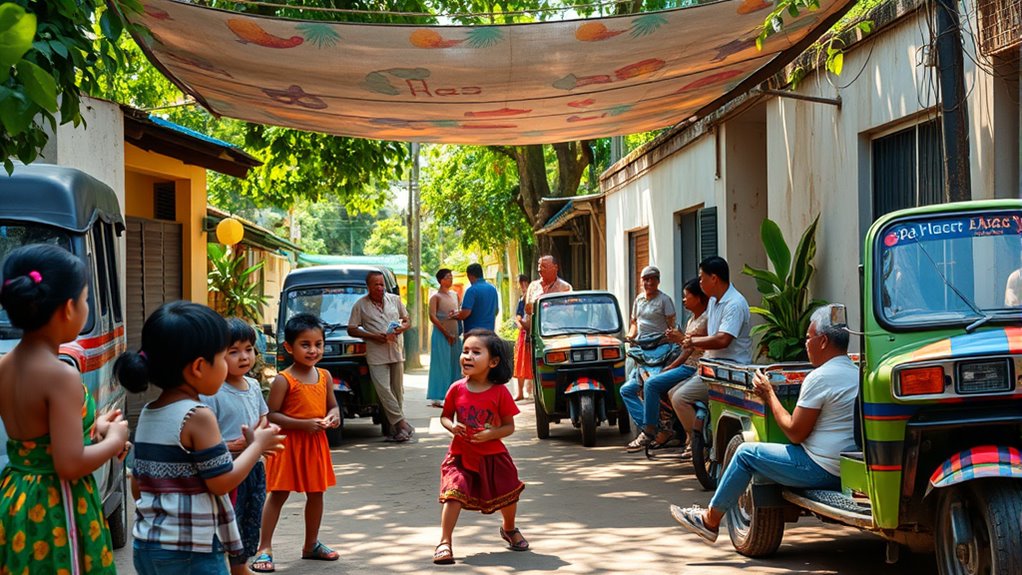
Strong community bonds, built on trust and loyalty, naturally extend into the domain of informal education and community involvement.
In the barrio, nonformal education empowers you by addressing local needs through vocational training and self-learning initiatives. Teachers often live within the community, fostering deeper connections and understanding.
With barrio high schools and supervised farming activities, education blends classroom learning with practical skills, enhancing self-sufficiency. You’ll notice that programs adapt to your culture, using local languages to guarantee comprehension.
This educational approach not only promotes unity but also encourages cultural preservation, empowering individuals to contribute positively to the community.
Through shared resources and collaborative efforts, leaders mobilize support, guaranteeing that education remains relevant and accessible for everyone in the barrio.
Economic Interactions and Local Entrepreneurship
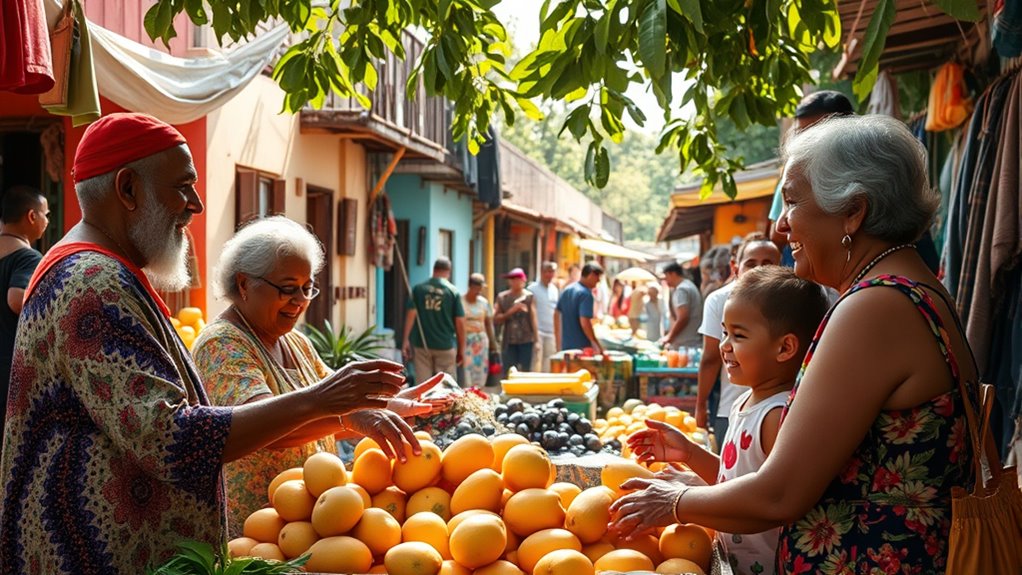
Economic interactions in barrios thrive on collaboration and community spirit, creating a vibrant atmosphere for local entrepreneurship.
You’ll notice how residents rely on each other for financial support, strengthening those vital community bonds. Street vendors and small businesses pop up, providing necessary goods and services right at your doorstep.
These barrios often serve as incubators for micro-businesses, with local markets acting as essential hubs for buying and selling. You’ll see informal economies flourishing, from street food stalls to repair services.
Community-led initiatives encourage cooperation, while skill-sharing workshops help sharpen entrepreneurial skills. Plus, with the integration of technology and local events, you’ll find that opportunities for growth and connection abound, making barrio life a unique experience for everyone involved.
Cultural Traditions and Heritage Preservation in Barrios
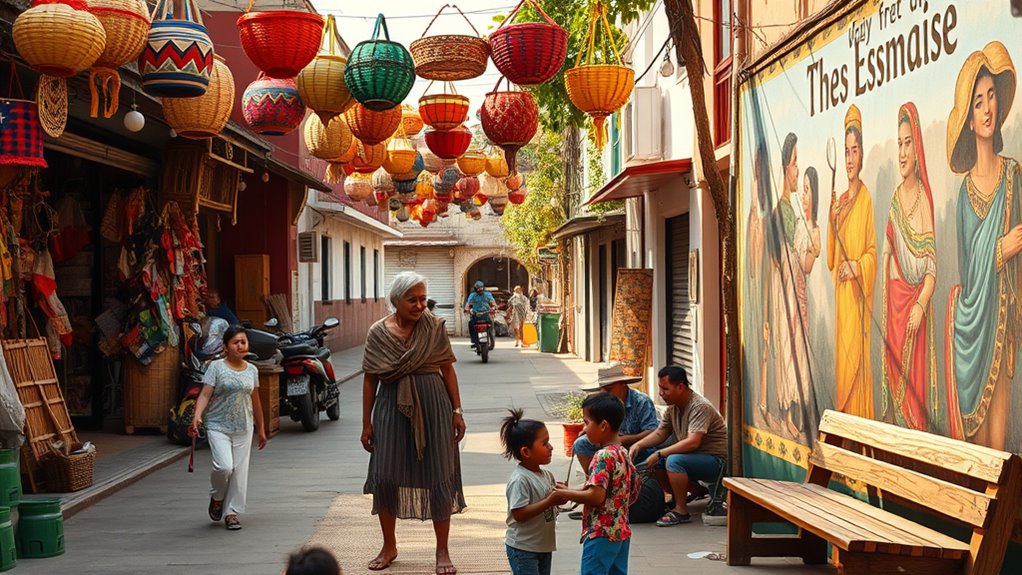
In the vibrant life of barrios, cultural traditions and heritage preservation play an essential role in shaping community identity. You’ll find that shared practices, like traditional clothing and oral histories, foster strong bonds among residents.
Barrio fiestas bring everyone together, showcasing parades, street dancing, and communal feasting that highlight local customs. These events not only celebrate your heritage but also educate younger generations about Filipino culture.
Museums and historic sites work tirelessly to preserve the architectural charm and stories of barrios, ensuring that your history remains alive. Through competitions, folk music, and shared responsibilities, barrios promote unity and belonging among residents.
This rich tapestry of traditions reinforces your connection to both the past and each other in the community.
Frequently Asked Questions
How Do Barrios Influence Migration Patterns in the Philippines?
Barrios influence migration patterns in the Philippines markedly. When you see limited job opportunities in your barrio, you might feel compelled to move to urban areas for better prospects.
Economic struggles and climate change can push you to seek stability elsewhere. Strong family ties may either anchor you to your community or encourage you to join relatives in cities.
What Role Do Women Play in Barrio Community Leadership?
Women in barrio communities lead, inspire, and innovate. They manage family finances, advocate for local policies, and organize community events.
They participate in barangay councils, driving decisions that shape their neighborhoods. By promoting healthcare initiatives and environmental conservation, they enhance community welfare.
Despite facing cultural barriers, they empower themselves and others through education and representation. Their leadership not only fosters social cohesion but also paves the way for future generations to thrive.
How Do Barrios Adapt to Urbanization and Modernization?
Barrios adapt to urbanization and modernization by embracing change while trying to maintain their cultural identity.
You’ll notice new businesses popping up, creating job opportunities for residents. Community members often engage in local initiatives to address infrastructure gaps, ensuring they access essential services.
However, you might feel the tension from overcrowding and rising inequality, which challenges social cohesion.
Through innovation and collaboration, barrios endeavor to balance tradition with the demands of a modern urban environment.
What Impact Do Natural Disasters Have on Barrio Relationships?
Natural disasters markedly impact barrio relationships by fostering a strong sense of community.
When disaster strikes, you and your neighbors often come together, sharing resources and providing emotional support. This collective response not only helps in immediate recovery but also strengthens bonds over time.
You might find yourself participating in communal kitchens or rebuilding efforts, which enhances trust and cooperation among residents.
Ultimately, these experiences create a resilient network, essential for maneuvering future challenges together.
How Do Social Media Affect Interactions Within Barrios Today?
Like a digital fiesta, social media’s vibrant presence transforms interactions within barrios today.
You find it easier to connect with neighbors, share local news, and engage in community discussions. These platforms become your virtual gathering spaces, where relationships blossom and trust grows.
However, you must navigate challenges like misinformation and privacy concerns. Embracing these tools can enhance your sense of belonging, allowing you to celebrate cultural identity while fostering deeper connections.
Conclusion
In summary, barrio life plays a crucial role in shaping Filipino relationships, fostering deep connections through trust and community support. Did you know that about 70% of Filipinos still live in rural areas, many of which are barrios? This statistic highlights the importance of these close-knit communities in preserving cultural traditions and promoting local entrepreneurship. By engaging with your barrio, you’re not just strengthening relationships; you’re also contributing to a rich tapestry of Filipino heritage and social cohesion.
